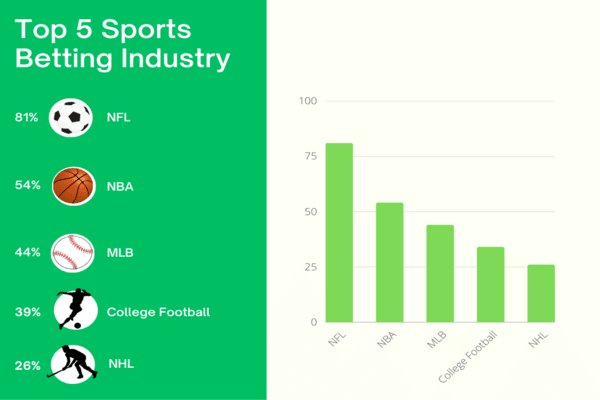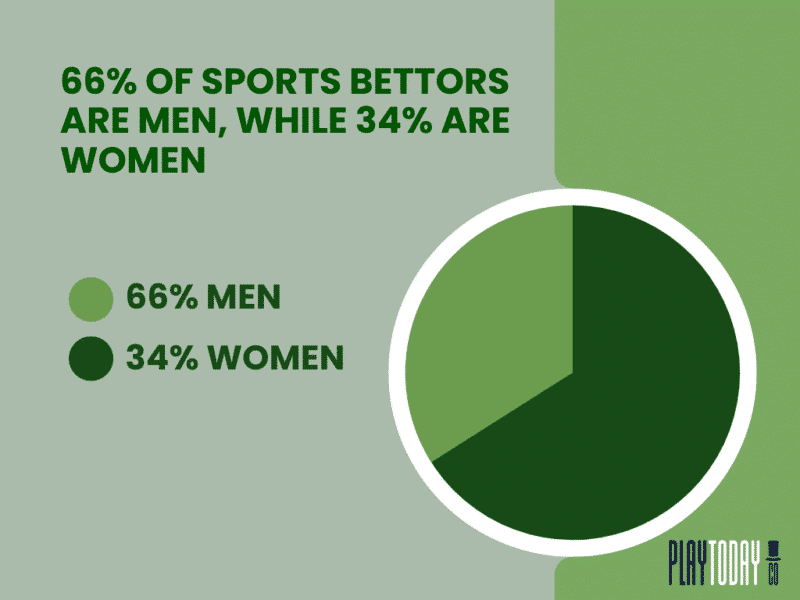Sports Betting Statistics: Trends, Revenue & Growth [2024]
Sports Betting is one of the major gambling industries, with 24,244 businesses worldwide, providing sports fans with ways to support their favorite teams while earning money.
The demand for Sports Betting is continuously thriving due to several countries lifting restrictions on betting and the rising popularity of eSports.
Discover the revenue of Sports Betting worldwide, and know the reasons behind its success through exciting statistics.
Highlights of the Article
- The online worldwide gambling market in 2021 increased by 21. 5 billion from 2016.
- The global Gambling Market is predicted to reach $79.8 billion in 2028.
- The Sports Betting market is forecasted to raise its revenue to 86% by 2028.
- The sports betting market in Asia-Pacific Region reached $21 billion in 2021.
- The eSports Betting is expected to grow at 14% CAGR by the end of 2030.
- League of Legends recorded the highest average eSports bet with €32.34 in 2020.
- Around 66% of Sports Bettors are Male.
- 78% of eSports Bettors are 18-25 in 2020.
- There are over 1 million active bettors in Mexico in 2022.
Sports Betting Growth and Revenue

Europe dominates the global Sports Betting market with an expected growth rate of 48.6% at the end of 2029.
The Sports Betting market is increasing daily due to the growing popularity of several sports and the influence of technology offering convenience and entertainment to gamblers worldwide.
The statistics below prove how global Sports Betting is massively increasing in popularity and revenue.

1. The online worldwide gambling market in 2021 increased by $21.5 billion from 2016.
(Statista)
The global online gambling and betting industry skyrocketed to $61.5 billion in 2021 from $40 billion in 2016.

The $21.5 billion increase in 5 years is statistical proof that the global gambling market, including the Sports Betting industry, is increasing.
2. The worldwide gambling market is expected to reach $133.9 billion in 2028.
(IMARC Group)
The online gambling market has reached $79.8 Billion in 2022, and experts foresee a growth of 8.5% during 2023-2028.
The development and changes in gambling laws and regulations – allowing sports betting activities in several countries and integrating technology- are the key drivers of this forecast.
3. Sports betting market in Asia-Pacific Region reached $21 billion in 2021.
(Global Data)
One of the major countries that play a significant role in the success of the Asia-Pacific Region is Singapore and South Korea.
Several sports betting companies are in Asia, but the leading ones are:
- The Hong Kong Jockey Club
- SportsBetting.ag.
4. eSports betting is expected to grow at 14% CAGR by the end of 2030.
(Grand View Research)
The drivers for this forecast are the increasing number of countries patronizing eSports and the overwhelming promotion worldwide.

The popularity of eSports in the global betting market grew during the pandemic due to the surge of eSports tournaments in 2020, and over 40% of the eSports events are held in Shanghai.
Operators took the chance to include eSports as one of the official Sports Betting categories.
Fun Fact
The biggest eSports team from Asia is T1, formerly SKT 1.
They are one of the most consistent finalists in the World Championships.
T1 has proven skills in the eSports games such as StarCraft, DOTA 2, and Valorant.
5. The sports betting market is expected to raise its revenue to 86% by 2028.
(Statista)
The Sports Betting market is rapidly recovering from the pandemic. In 2021 the industry generated $61.5 billion, which experts predict will rise to $114.4 billion by 2028.
Similarly, experts project that Sports Bettors worldwide will increase by 4.1 million from 2022-2023.
Statistics Behind Sports Betting Growth and Trends
Researchers believe that Sports Betting originated in ancient Greece in athletic competitions over 2,000 years ago. While in America, the first state to legally allow Sports Betting was Las Vegas.
The industry has survived and contributed to the success of global gambling revenue, as discussed above.
Below are factors that led to the peak and continuous growth of Sports Betting in 2023.
6. NFL is the sport with the most placed bets in the United States in 2022.
(Rotowire)
In 2022, National Football League ranked first as the sport with the most placed bets in America, with 81% of bettors 18 years and older putting bets on the NFL.
Football is a real obsession among sports fans in the US, and about 30% of the population watches Football.

While NBA comes after Football with 54%, then MLB with 44%, and the list continues.
7. PaddyPower.com is the leading 2023 sports book-related website in the UK.
(Statista)
The most popular betting platform in the UK is PaddyPower in terms of share of voice, with 6.53% in the second quarter of 2023.
PaddyPower is followed by olbg.com and telegraph.com as the UK’s second and third leading sportsbook websites.
Quick Tip
Bet on Soccer games because it has the best odds among all Sports Betting categories, with a 5-10% return on investment.
Knowing the probability through ROI in Sports Betting is essential before putting your money on the line.
8. League of Legends recorded the highest average eSports bet with €32.34 in 2020.
(eSports Insider)
LOL ranks first as the game with the highest average eSports bet, with €32.34 in 2020, followed by:
- King of Glory – €30.65
- Call of Duty – €27.20
The eSports betting volume trends show that CS: GO and DOTA 2 had low bets among all eSports games, averaging € 21.41 and €20.64, respectively.
However, DOTA 2 holds the highest prize at $233.6 million in 2021.
9. Bet365 ranks 1st as the leading gambling company which offers Sports Betting worldwide in 2021.
(Statista, Statista)
These platforms can turn quite a profit. For example, William Hill had an impressive $2.37 billion sports betting revenue in 2015.
That year, the total amount wagered with the company was much higher, close to $13.3 billion.
10. In 2018, Sports Betting was legalized by the US Supreme Court.
(Statista)
Online gambling companies have since been a growing part of the sports betting segment, gaining prominence in sports betting statistics.
During Super Bowl 2022, live coverage by Yahoo Finance revealed that more than 45 million Americans could wager legally on sports due to the new status of sports betting in America.
Source: (368) Sports betting: The legal status of US gambling ahead of the 2022 Super Bowl – YouTube
It was forecasted to reach $7.61 billion in the total amount bet on the Super Bowl during the show, which is much bigger than 2021’s total betting expectation.
11. 33 US states have legalized Sports Betting in 2023.
(Forbes)
Sports Betting has taken over the 33 states in the US, allowing its people to partake in one of the most lucrative gambling activities.
Below are the states that allow Sports Betting.

Although several states have provided legal considerations in online betting – 80% of US citizens are not a fan of eSports which is the hottest online betting option in the market.
Sports Betting Demographics
In America, data showed from Morning Consult that there was an increase of 80% of adults who consistently bet on sports in 2021.
Below are the demographics of Sports Bettors worldwide in terms of gender and age range in the eSports betting market.
12. 66% of sports bettors are male in a 2022 survey.
(Fantasy Sports & Gaming Association, Escharts)
There is only a little media coverage for women’s sports making it one of the reasons why only a few females bet on sports. It limits the options for women to support female athletes.

However, there is massive support in eSports tournaments featuring women, such as the record-breaking Shopify Rebellion tournament, with 3.07 million hours watched worldwide.
13. Around 78% of eSports Bettors were 18-25 in 2020.
(eSports Insider)
Data revealed that most of the eSport fans are from Generation Z. These digital natives and avid gamers are hooked by eSports betting.

It reveals that ages 40 and above are not interested in eSports betting, with only 1% of the population.
14. There are over 1 million active bettors in Mexico in 2022.
(Yogonet)
The popularity of Sports Betting in Latin America is rising as the online sportsbooks and availability of mobile betting apps in the region.
It is estimated to have over 1 million Latin-American active bettors in Mexico alone.
15. Approximately, there are 196.8 million sports bettors in Japan Racing Association from 2013 to 2022.
(Statista)
Horse racing is one of the limited options in which Japanese can participate in Sports Betting. For over nine years, JRA recorded 196.8 million sports bettors.
Japan has only four sports betting options: motorboats, bicycles, auto racing, and horse racing, with the highest revenue.
Bottomline
Sports Betting has contributed a significant share to the global gambling market and the amount of money gamblers spend, which helps businesses and employees in the industry to survive.
It is undeniable that Sports Betting can lead to addiction and bankruptcy, but with moderation and self-control, you can enjoy the experience and the thrill of gambling.
Quick Tip
You can bet on a virtual team you can assemble with real-life players to compete against other players’ fantasy teams.
In this betting format, points are counted based on scores by players you chose and not by the competing teams.
If you want to know more, read this article Fantasy Sports Betting.
FAQs
What percentage of sports bettors win?
Even the most experienced sports bettors only have a 55% win rate at best. More commonly, they win 53% or 54% of the time.
What is the hardest Sports Betting category the hardest to win?
The hardest sport to bet on is baseball because it is unpredictable due to long game seasons, and the players’ performance varies from time to time.
Are Sports Betting profitable?
Yes, Sports Betting can be profitable. Sports betting can be lucrative if you’re smart, patient, and have much experience.
What is the most profitable Sports Betting segment?
Football is the most profitable Sport to wager on; with its large player base and expensive PPV, the football stakes are higher than other sports.
 BC.Game
BC.Game  BitStarz
BitStarz  Ducky Luck
Ducky Luck  Red Dog Casino
Red Dog Casino